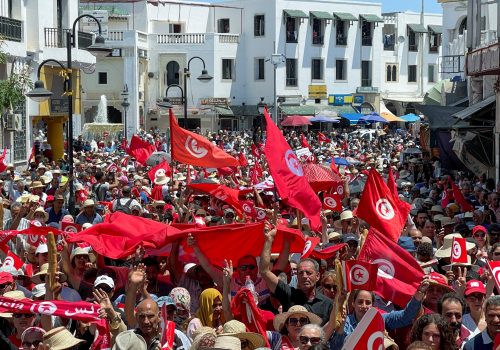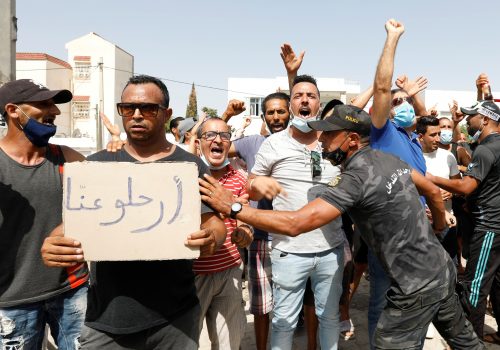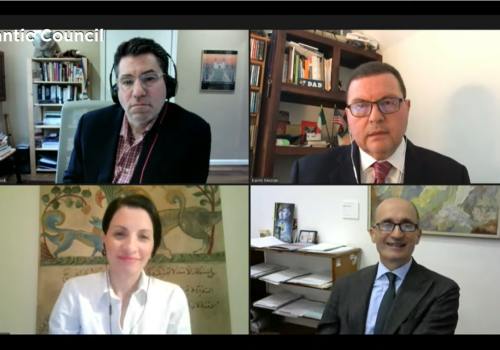It’s time for Tunisia’s president to resign. Here’s why.
The sound of Tunisia’s silence was deafening after only 11.2 percent of Tunisians—one million out of nine million eligible voters—participated in the December 17 parliamentary elections. President Kais Saied called for elections after sacking Prime Minister Hichem Mechichi, suspending and later dissolving parliament, ruling by decree for over a year, and adopting a new constitution on July 25 on a mere 31 percent voter turnout (which empowers the president to appoint both the prime minister and government and, worryingly, makes it impossible to impeach him).
Now, President Saied is presiding over a country that has expressed its complete disapproval of his one-man rule through the lowest parliamentary voter turnout in Tunisia’s recent history. Considering the widespread dissatisfaction, President Saied has no other option but to step down, and Western democracies should fiercely condemn the vote and establishment of the new parliament.
It is arguable that Saied is merely attempting to install a semi-presidential system not too dissimilar to the French one. However, it is difficult to see such similarities after the drastic measures the president has taken to reduce legislative power and the fact that impeachment is still possible in the French system. It’s also worth noting that the 1958 French constitutional vote that transformed the country into a semi-presidential system saw a voter turnout of 84.9 percent.
The main opposition parties, trade unions, and electoral watchdog civil society organizations mounted a widespread boycott of the vote, which undoubtedly impacted the low voter turnout. The Tunisian political group, the National Salvation Front, which includes Tunisia’s largest opposition party, Ennahda (among others), called for a boycott of the vote in September, accusing President Saied of orchestrating a coup d’état. The boycott led to widespread demonstrations across the country in September. The powerful Tunisian General Labor Union (UGTT) also announced its opposition to the December 17 vote, citing “ambiguity” over Saied’s “individual rule” after the president cut government subsidies affecting millions of Tunisians. Just days before, on December 13, the parliamentary watchdog Al Bawsala announced that it would “refuse to be a false witness to a…puppet parliament” and its intent to delegitimize the president.
The country’s dire economic situation has led Tunisians to become more preoccupied with finding basic food supplies rather than casting a vote. The war in Ukraine and COVID-19 pandemic have caused inflation to skyrocket while supermarkets have experienced empty shelves and food shortages. Viral videos on Twitter of Tunisians at supermarkets hoarding bread in late September caused widespread shock and initiated calls for action by political activists. The International Monetary Fund (IMF) is due to help subsidize the country’s economic woes through a $1.9 billion bailout package. However, talks are stalled due to the UGTT’s fierce opposition to the IMF’s demands for public spending cuts.
Tunisians have also grown disillusioned by their leadership’s inability to deliver on their promises for a better future following former Tunisian President Ben Ali’s fall in 2011. Tunisian youth unemployment is almost at a staggering 40 percent, with more youth leaving the country for better opportunities abroad. Social protection schemes to help the more vulnerable are largely funded by external donors, such as the World Bank, United States, and UNICEF, all of which contributed over $60 million to expand Tunisia’s national Social Safety Net plan.
The Tunisian people’s lack of trust also comes on the backdrop of President’s Saied crackdown on the judiciary, his overtake of the country’s electoral commission (ISIE), and the detention of the main opposition leader, Rached Ghannouchi. Former Prime Minister and Vice President of Ennahda, Ali Larayedh, was imprisoned just days after the December 17 vote on alleged terrorism charges, a move which opposition parties are labeling a “flagrant attempt” to distract the country from the election’s dismal results.
It is clear President Saied has lost all legitimacy to rule over a country that was once deemed as the sole survivor of the Arab Spring. The fierce opposition to his rule and widespread popular discontent and disaffection that lead to the lowest turnout in Tunisia’s history since the 2011 uprisings are a testament to Saied’s loss of popular support.
Western democracies should stand clear from further endorsing him, as this will weaken the Tunisian path towards democratic rule. US President Joe Biden’s photo opportunity with President Saied at the US-Africa Leaders Summit on December 16 sent a worrying message to a people striving for democracy by pardoning a president fighting to undermine it. State Department Spokesman Ned Price’s December 18 statement applauding the parliamentary elections as an “essential initial step towards restoring the country’s democratic elections” is, at best, a naïve attempt to undo a democratic backsliding that President Saied has long pushed for—all at the expense of the Tunisian people, whose voices remain unheard and inhibited.
Alissa Pavia is the associate director for the North Africa Initiative within the Rafik Hariri Center & Middle East Programs at the Atlantic Council.
Further reading
Tue, Jul 26, 2022
Experts react: Tunisia’s president cemented his power grab with a referendum vote. What does it mean for North Africa?
MENASource By Karim Mezran, Emadeddin Badi, Alia Brahimi, Alessia Melcangi, Alissa Pavia
Atlantic Council experts share their thoughts on the vote and what it means for North Africa writ large.
Tue, Jul 27, 2021
Experts react: What’s next after Tunisian president’s parliamentary freeze?
MENASource By
On July 25, President Kais Saied invoked Article 80 of Tunisia’s constitution to sack Prime Minister Hichem Mechichi and dissolve parliament. Atlantic Council experts react to the events, assess the impact on the fledgling democracy, and offer their thoughts on how the international community may respond.
Fri, Mar 11, 2022
North Africa’s transatlantic relations: How the US can engage its European allies in North Africa
MENASource By
As Russia’s invasion of Ukraine continues, US and European partnership and collaboration in North Africa becomes imperative to protecting shared values across the region.
Image: Farouk Bouasker President of the Independent High Authority for Elections (ISIE), speaks during the announcement of the preliminary results of first round of the Tunisian parliamentary elections in Tunis, Tunisia, 19 December 2022.Farouk Bouasker announced that 1,025,418 voters went to the polls, representing a general turnout of 11.22 percent. (Photo by Yassine Mahjoub/NurPhoto)


